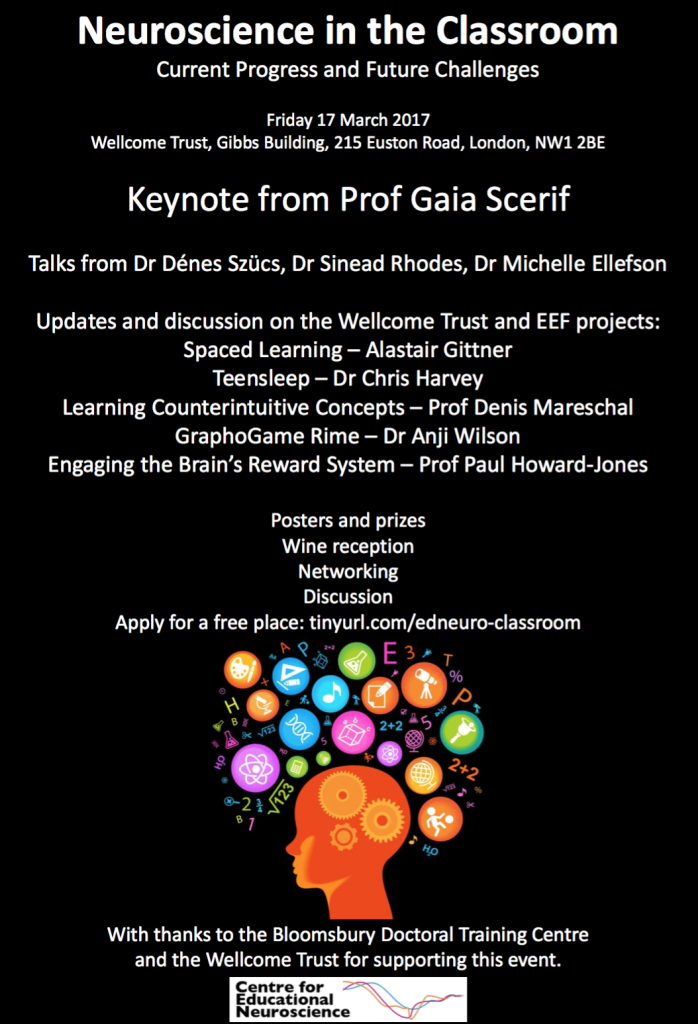The Wellcome Trust hosted the CEN’s eagerly anticipated workshop last Friday 17th March, which was organised by a group of PhD students from the CEN. Nearly 100 delegates attended, with a broad spread of academics, students, teachers, consultants and individuals from charities and organisations.
The morning’s sessions focused on research linking different aspects of brain and cognitive functioning to children’s academic performance and skills. Professor Gaia Scerif’s excellent keynote talk opened the workshop. She presented findings on various aspects of attention control and preschool maths from an integrated cognitive, neuroscientific and educational perspective. Three talks followed focusing on children’s educational outcomes. Dr Denes Szucs, University of Cambridge (pictured above), firstly discussed the cognitive correlates of dyscalculia and discussed the characteristics of individuals who suffer from maths anxiety. On the latter topic, he suggested that maths ability doesn’t always correlate with anxiety; some individuals with strong maths skills still experience maths anxiety. Dr Sinead Rhodes, University of Edinburgh, presented data which suggested that visual-spatial working memory was predictive of conceptual understanding of chemistry. Finally, Dr Michelle Ellefson, University of Cambridge, discussed her recent research which compares parent and child cognitive data between the UK and Hong Kong. Interestingly, her findings indicate that children from Hong Kong performed better on tests of executive function than children in the UK, but, parents performed at a similar level between the two countries.
During lunch, 15 posters were presented on a range of topics including spatial cognition and maths and science reasoning and inhibitory control. The two winners of the poster prize were Marialivia Bernardi (academic achievement in children with typical and atypical motor coordination: the contribution of intellectual ability and executive functioning) and Eugenia Marin-Garcia (functional neuroimaging of the testing effect). The prizes were presented by Lia Commissar, project manager for the Wellcome Trust’s Neuroscience and Education project.
The afternoon focused on neuroscience-informed interventions. Representatives of the Wellcome / Education Endowment Foundation funded intervention projects each presented a 15-minute summary of their progress and discussed any challenges they have experienced to date. This was then followed by a lively and thought-provoking panel discussion involving the project representatives, chaired by Professor Gaia Scerif. Delegates had been invited during the day to submit their questions, which were addressed by the panel and the audience. A common theme was discussing ways in which teachers and researchers could better connect; for example, in terms of teachers being able to access research findings. Professor Courtenay Norbury suggested that becoming a school governor has been an excellent way for her to get more closely involved in schools.
Overall, we were thrilled by the response to day both in terms of the excellent feedback we received and the number of people showing interest in the workshop. Because we had nearly 100 people on the waiting list for places who we were unable to invite, we decided to film the event. Videos from the day are here. The order in the playlist corresponds to the order of the day – see the program below.
———————————————————————————————————
Friday 17th March 2017 at the Wellcome Trust, Gibbs Building, 215 Euston Road, London, NW1 2BE
Programme for the day
09:00-09:30 Registration
09:30-10:55 Keynote: Professor Gaia Scerif, University of Oxford
10:55-11:15 Coffee break
11:15-13:00 Educational Outcomes:
- Dr Michelle Ellefson (University of Cambridge) -Executive functions and academic skills in older children
- Dr Denes Szucs (University of Cambridge) – Developmental dyscalculia and mathematics anxiety
- Dr Sinead Rhodes – The role of executive functions in understanding and applying scientific knowledge
13:00-14:00 Lunch (included) and poster presentations
14:00-15:30 Wellcome Trust and Education Endowment Foundation projects:
- Spaced Learning – Alastair Gittner
- Teensleep – Dr Chris Harvey
- Learning Counterintuitive Concepts – Prof Denis Mareschal
- GraphoGame Rime – Dr Anji Wilson
- Engaging the Brain’s Reward System – Prof Paul Howard-Jones
- Fit To Study – Catherine Wheatley
15:30-16:00 Coffee break
16:00-16:55 Panel discussion
16:55-17:00 Poster prize announcement and close
17:00-18:00 Wine reception and networking
———————————————————————————————————

